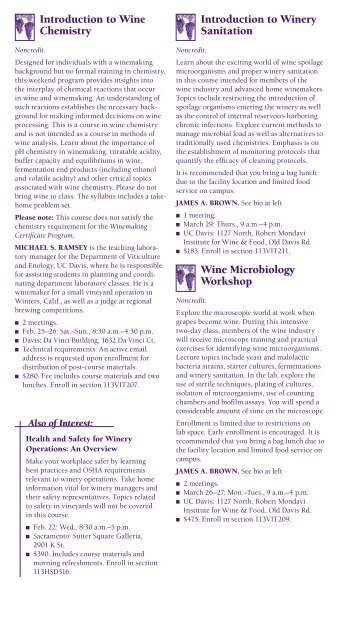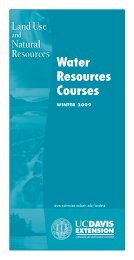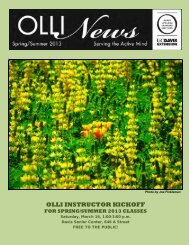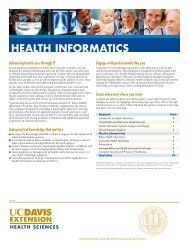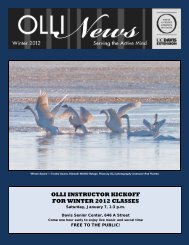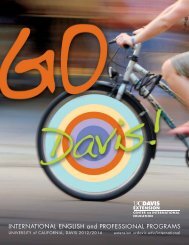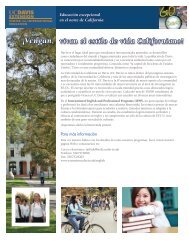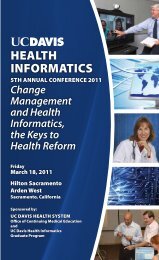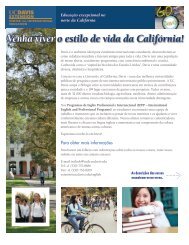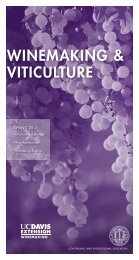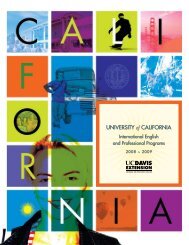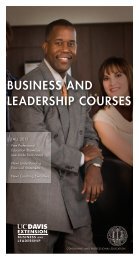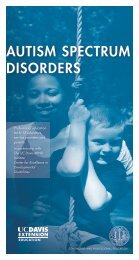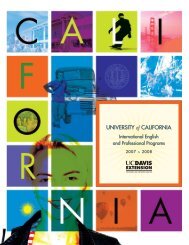Winemaking and Viticulture Courses - UC Davis Extension
Winemaking and Viticulture Courses - UC Davis Extension
Winemaking and Viticulture Courses - UC Davis Extension
- No tags were found...
Create successful ePaper yourself
Turn your PDF publications into a flip-book with our unique Google optimized e-Paper software.
Introduction to WineChemistryNoncredit.Designed for individuals with a winemakingbackground but no formal training in chemistry,this weekend program provides insights intothe interplay of chemical reactions that occurin wine <strong>and</strong> winemaking. An underst<strong>and</strong>ing ofsuch reactions establishes the necessary backgroundfor making informed decisions on wineprocessing. This is a course in wine chemistry<strong>and</strong> is not intended as a course in methods ofwine analysis. Learn about the importance ofpH chemistry in winemaking, titratable acidity,buffer capacity <strong>and</strong> equilibriums in wine,fermentation end products (including ethanol<strong>and</strong> volatile acidity) <strong>and</strong> other critical topicsassociated with wine chemistry. Please do notbring wine to class. The syllabus includes a takehomeproblem set.Please note: This course does not satisfy thechemistry requirement for the <strong>Winemaking</strong>Certificate Program.MICHAEL S. RAMSEY is the teaching laboratorymanager for the Department of <strong>Viticulture</strong><strong>and</strong> Enology, <strong>UC</strong> <strong>Davis</strong>, where he is responsiblefor assisting students in planning <strong>and</strong> coordinatingdepartment laboratory classes. He is awinemaker for a small vineyard operation inWinters, Calif., as well as a judge at regionalbrewing competitions.■■2 meetings.■■Feb. 25–26: Sat.–Sun., 8:30 a.m.–4:30 p.m.■■<strong>Davis</strong>: Da Vinci Building, 1632 Da Vinci Ct.■■Technical requirements: An active emailaddress is requested upon enrollment fordistribution of post-course materials.■ ■ $280. Fee includes course materials <strong>and</strong> twolunches. Enroll in section 113VIT207.Also of Interest:Health <strong>and</strong> Safety for WineryOperations: An OverviewMake your workplace safer by learningbest practices <strong>and</strong> OSHA requirementsrelevant to winery operations. Take homeinformation vital for winery managers <strong>and</strong>their safety representatives. Topics relatedto safety in vineyards will not be coveredin this course.■■Feb. 22: Wed., 8:30 a.m.–5 p.m.■■Sacramento: Sutter Square Galleria,2901 K St.■ ■ $390. Includes course materials <strong>and</strong>morning refreshments. Enroll in section113HSD516.Introduction to WinerySanitationNoncredit.Learn about the exciting world of wine spoilagemicroorganisms <strong>and</strong> proper winery sanitationin this course intended for members of thewine industry <strong>and</strong> advanced home winemakers.Topics include restricting the introduction ofspoilage organisms entering the winery as wellas the control of internal reservoirs harboringchronic infections. Explore current methods tomanage microbial load as well as alternatives totraditionally used chemistries. Emphasis is onthe establishment of monitoring protocols thatquantify the efficacy of cleaning protocols.It is recommended that you bring a bag lunchdue to the facility location <strong>and</strong> limited foodservice on campus.JAMES A. BROWN. See bio at left■■1 meeting.■■March 29: Thurs., 9 a.m.–4 p.m.■■<strong>UC</strong> <strong>Davis</strong>: 1127 North, Robert MondaviInstitute for Wine & Food, Old <strong>Davis</strong> Rd.■ ■ $185. Enroll in section 113VIT211.Wine MicrobiologyWorkshopNoncredit.Explore the microscopic world at work whengrapes become wine. During this intensivetwo-day class, members of the wine industrywill receive microscope training <strong>and</strong> practicalexercises for identifying wine microorganisms.Lecture topics include yeast <strong>and</strong> malolacticbacteria strains, starter cultures, fermentations<strong>and</strong> winery sanitation. In the lab, explore theuse of sterile techniques, plating of cultures,isolation of microorganisms, use of countingchambers <strong>and</strong> biofilm assays. You will spend aconsiderable amount of time on the microscope.Enrollment is limited due to restrictions onlab space. Early enrollment is encouraged. It isrecommended that you bring a bag lunch due tothe facility location <strong>and</strong> limited food service oncampus.JAMES A. BROWN. See bio at left■■2 meetings.■■March 26–27: Mon.–Tues., 9 a.m.–4 p.m.■■<strong>UC</strong> <strong>Davis</strong>: 1127 North, Robert MondaviInstitute for Wine & Food, Old <strong>Davis</strong> Rd.■ ■ $475. Enroll in section 113VIT209.


